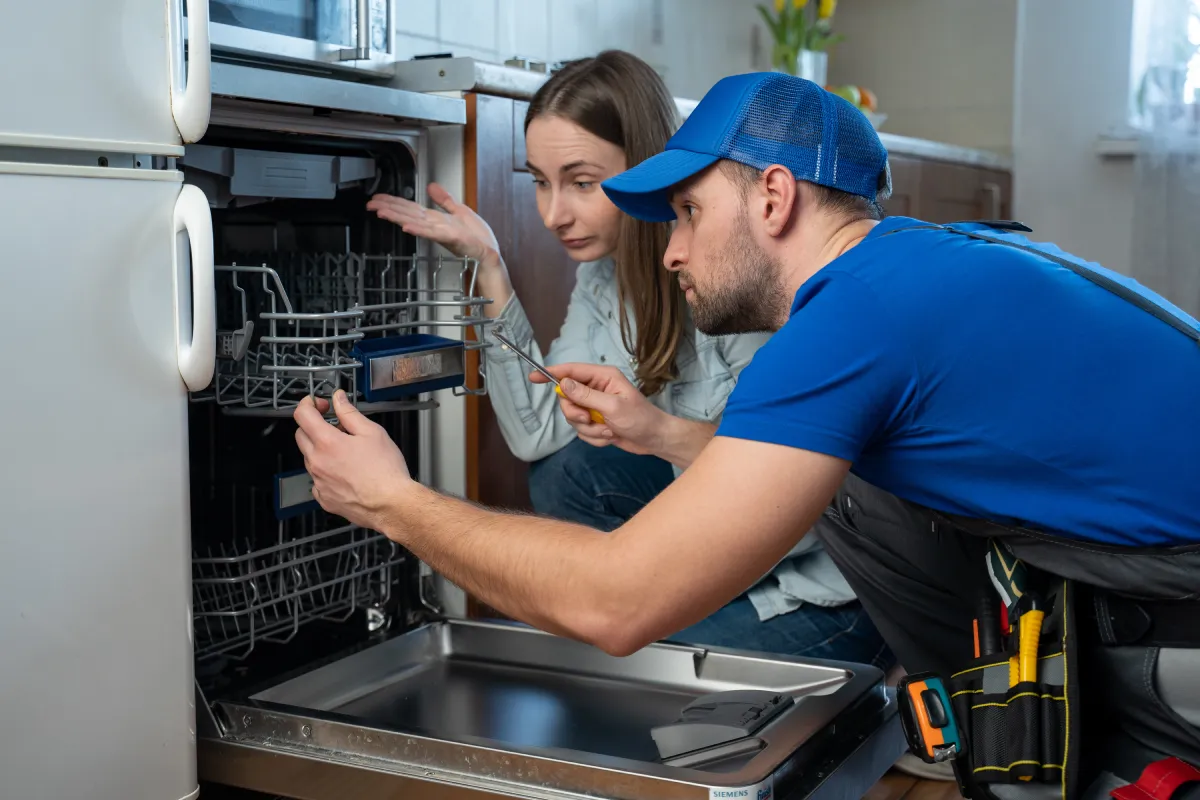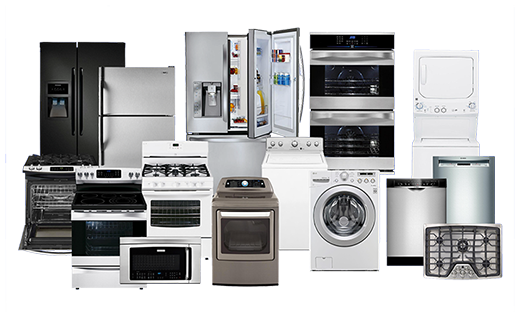The Ultimate Guide to Recognizing Appliance Repair Service in the house
When your fridge quits cooling down or your stove refuses to heat, it can feel frustrating. Understanding appliance repair in the house can conserve you money and time. You'll discover to acknowledge symptoms, use necessary devices, and comply with an organized troubleshooting process. However prior to you start, there are crucial safety preventative measures you need to take into consideration. What are the most common problems, and just how can you repair them? Let's check out the basics.
Typical Device Troubles and Their Signs
When your home appliances start breaking down, it's vital to identify the indications early. Overlooking them can result in larger issues and costly fixings. If your fridge isn't cooling down appropriately, you might discover cozy spots or condensation forming. This can suggest a stopping working compressor or a blocked vent.Your dishwasher might show troubles with dirty recipes or uncommon noises during cycles. If you listen to grinding or clanking, it's time to investigate.A cleaning device that will not rotate or drain pipes can leave you with soaked washing, suggesting a clogged up drainpipe or a malfunctioning pump.Lastly, if your oven's temperature appears off or it takes permanently to pre-heat, you may be dealing with a faulty thermostat. By staying sharp to these signs, you can address issues before they rise into significant repairs.
Crucial Devices for Appliance Repair Service
When you're taking on device repair services in the house, having the right tools is necessary. Basic hand tools like screwdrivers and pliers will certainly assist you dismantle and repair different devices, while electrical screening devices guarantee you're working securely with wiring. Allow's look at what you require to get going on your repair work trip.
Basic Hand Tools
Having the right devices is essential for efficient appliance repair service at home. Beginning with a trusted screwdriver set, consisting of both flathead and Phillips types, as screws prevail in home appliance assembly. Pliers are likewise crucial; they assist with gripping, turning, and reducing cables or tiny elements. A pair of needle-nose pliers can reach tight areas conveniently. You'll need an excellent adjustable wrench for tightening or loosening up nuts and screws. An energy knife is convenient for puncturing product packaging or insulation. Lastly, don't forget a durable workbench or surface area to safely arrange your devices and parts. With these standard hand devices, you'll be well-prepared to take on most home appliance repairs that come your means.
Electric Testing Instruments
Together with basic hand devices, electrical screening devices play a vital duty in device repair. These devices aid you diagnose electric problems and assurance home appliances function securely. A multimeter is important; it gauges voltage, existing, and resistance, permitting you to identify problems rapidly. A non-contact voltage tester is another essential, allowing you detect real-time cords without making straight contact, enhancing your security. Secure meters are terrific for measuring current flow in cables without separating them, conserving you effort and time. Additionally, circuit testers can promptly check if outlets are functioning effectively. By utilizing these devices, you'll improve your troubleshooting process and boost your repair work skills, making device maintenance a great deal easier.
Step-by-Step Guide to Diagnosing Device Issues
When your home appliance breaks down, it can be frustrating, but diagnosing the issue does not need to be frustrating. You'll discover to determine common issues and use efficient fixing methods. Let's stroll with the steps to get your home appliance back in functioning order.
Typical Appliance Issues

Troubleshooting Techniques Clarified

Repairing Major Kitchen Area Home Appliances: A Closer Look
Have you ever wondered exactly how to tackle typical issues with your cooking area appliances? Fixing significant kitchen area appliances like fridges, ovens, and dish washers can be much easier than you think. Start by recognizing the problem-- whether it's a fridge not cooling down or an oven that won't warm. Usually, a simple reset or inspecting the source of power can fix the issue.For refrigerators, clean the condenser coils and inspect the door seals. If your stove's not home heating, examine the burner and thermostat. Dishwashing machines could simply require a clean filter or a reset to get them back at work. Constantly disconnect the home appliance prior to diving right into fixings to assure your safety.Don' t neglect to get in touch with the individual handbook for particular fixing pointers connected to your model. With a little bit of persistence and the right tools, you can with confidence tackle home appliance repair services and save cash while doing so!

Fixing Washing Appliances: Tips and Techniques
When your washing appliances start breaking down, it can really feel overwhelming, however troubleshooting them doesn't have to be an inconvenience. Begin by inspecting the power supply. Confirm the appliance is plugged in and the outlet is functioning. Next, examine the door or cover button; a faulty switch can stop the machine from operating.For washing machines, if it's not spinning, inspect for unbalanced loads. Rearranging the garments might solve the problem. If your dryer isn't home heating, tidy the dust filter and check the air vent for blockages.Listen for uncommon sounds; they can show a trouble. If your appliance is leaking, examine the tubes for cracks or loose connections. Document any mistake codes presented on electronic screens, as they can lead you in determining the issue. Finally, get in touch with the individual manual for specific troubleshooting pointers associated with your model.
Security Precautions to Take Throughout Fixes
Before you start any kind of home appliance repair work, it's important to prioritize security to avoid crashes or injuries. Unplug the home appliance or turn off the circuit breaker to assure no power reaches it while you function. Usage insulated tools to reduce the threat of electrical shock. Put on safety goggles and gloves to shield on your own from sharp edges or debris (Dryer repair Oro Valley Dependable Refrigeration & Appliance Repair Service).Make certain your work area is neat and well-lit, so you can see what you're doing. Maintain youngsters and pets away from the location to stay clear of diversions and potential dangers. If you're managing gas appliances, be added mindful; look for leakages prior to proceeding.Take your time, and don't rush with repair services. If you really feel unsure concerning any step, it's much better to pause and research than to guess. Complying with these safety measures will certainly assist develop a safer atmosphere for your do it yourself home appliance repair work job
When to Call an Expert for Assistance
How do you know if it's time to call in a specialist for device fixings? If you have actually tried fundamental troubleshooting without success, it's a clear indication. For instance, if your appliance still won't begin or shows uncommon sounds after resetting it, do not hesitate to look for specialist help.When you notice leaks, smoke, or burning smells, prioritize security and call a professional right away. These issues can result in more significant damage or pose risks to your home.Also, if your appliance is under warranty, getting in touch with an expert is typically the most effective route. They can guarantee that repairs will not nullify your service warranty, conserving you money in the lengthy run.Finally, if you're unsure or awkward with complex repair work, it's a good idea to leave it to the specialists. Keep in mind, tackling challenging issues without the best know-how can cause costly mistakes. Count on a professional when unsure!
Regularly Asked Concerns
Just How Can I Avoid Device Problems in the Future?
To avoid appliance issues in the future, you need to do normal upkeep, check for damage, clean filters, and stay clear of overloading. Remaining positive will certainly aid extend their life expectancy and maintain them running efficiently.
What Are the Many Typical DIY Appliance Repair Work Mistakes?
You could forget safety precautions, miss repairing actions, or utilize inaccurate tools when trying DIY home appliance repairs. Rushing the process or neglecting producer standards can cause even more significant problems and pricey mistakes. Remain client and informed!
Exactly how Do I Know if a Component Demands Replacement?
You can inform if a part requires substitute by checking for unusual sounds, leakages, or irregular efficiency. If the home appliance battles to run properly or reveals noticeable damages, it's most likely time for a substitute.
Can I Use Generic Components for Home Appliance Fixes?
Yes, you can make use of generic parts for device fixings, however identify they work - Lg Dryer repair near me Dependable Refrigeration & Appliance Repair Service. Generic components may conserve you cash, however they could influence performance or longevity, so consider your choices meticulously prior to deciding
What Warranties Cover Device Fixes?
Most device warranties cover repairs for manufacturing issues, but they usually leave out damage from abuse. Inspect your warranty terms thoroughly, as some could call for making use of qualified technicians and initial parts for insurance coverage to remain valid.